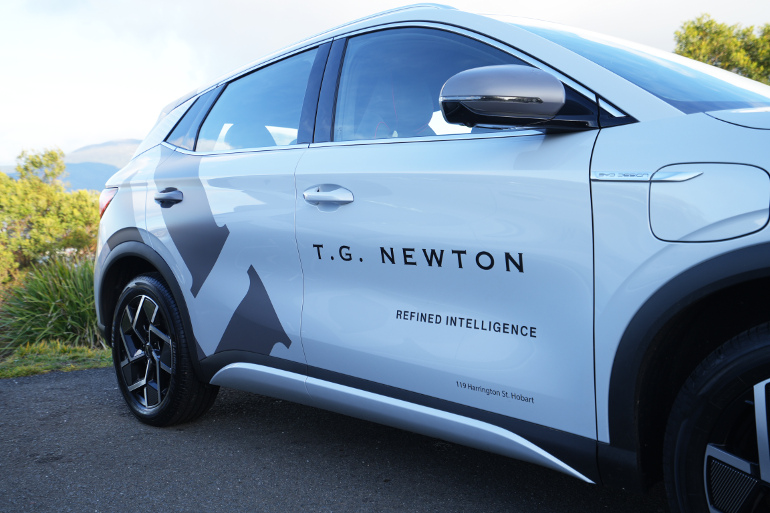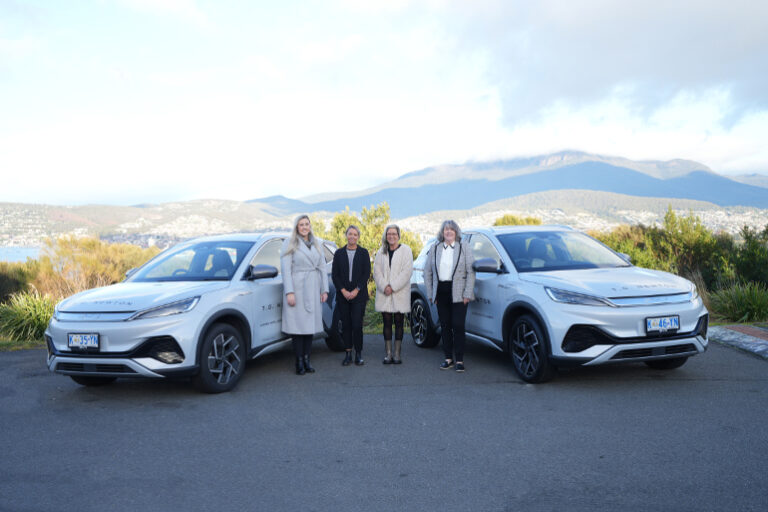“Our journey towards electric vehicles began with three Teslas, which have been owned by the company’s directors for the past two years,” shares Nawwar Alshawi, Managing Partner at T.G. Newton in Hobart. “We were quickly captivated by the technological advancements of the Teslas, such as their ability to remember different user profiles across multiple drivers and integrate seamlessly with our calendars and maps.”
Once the company’s principals became accustomed to driving electric vehicles, the focus shifted towards transitioning the rest of the company’s fleet. To accomplish this, they acquired a total of nine BYD Atto 3 vehicles, completing the fleet’s transition.
“I believe we are the first fully electric real estate agency in Australia,” states Alshawi, “and our staff takes pride in driving electric and working for a company that is committed to making a positive impact on climate change.”
The BYD Atto 3 vehicles are shared among the company’s agents, who split their time between the Hobart office and site inspections across southern Tasmania. Initially, there were misconceptions to address, particularly regarding range anxiety and charging concerns. However, the staff’s eagerness to try the electric cars has transformed into a genuine appreciation for the smooth driving experience, technological features, and powerful engines of the Atto 3.
Financial incentives, such as the exemption from stamp duty on EV purchases in Tasmania and the absence of Federal Fringe Benefit Tax on EVs bought after July 2022, have made the transition even more attractive. However, for T.G Newton, the decision was primarily driven by a commitment to environmental sustainability, the technological advantages of electric driving, and the positive impact on staff morale.
Charging of the vehicles takes place on-site, where three Delta AC Max units have been installed in the garage. Although the main switchboard had sufficient electrical capacity, physical space was limited, necessitating the installation of a sub-board as part of the project. The Delta AC Max can be configured as a single-phase or three-phase unit and was set up as single-phase to align with the Atto 3’s power requirements.
The installation has the potential to be expanded in the future to accommodate three-phase charging, additional charging units, and the integration of load management hardware if required. Moreover, the Delta AC Max is OCPP compatible, enabling easy integration with fleet management software should the fleet choose to utilize it in the future.
For T.G. Newton, installing charging equipment was an obvious decision, as the company owns the building housing its office. “As part of our sustainability efforts, we have implemented various measures, including monitoring our paper consumption, eliminating single-use plastic bottles, and transitioning towards a paper-free workplace through digital documentation,” explains Alshawi. “Additionally, we have equipped our rooftop with solar panels, which were projected to have a four-year payback period even before factoring in the fuel savings from the electric cars.”
For small fleets considering a transition, Alshawi recommends conducting a feasibility study to assess the financial investment in relation to the fleet’s usage patterns and the company’s moral values. In cases where a company headquarters is owned or on a long lease, the installation of solar panels and charging infrastructure becomes a highly practical choice.







